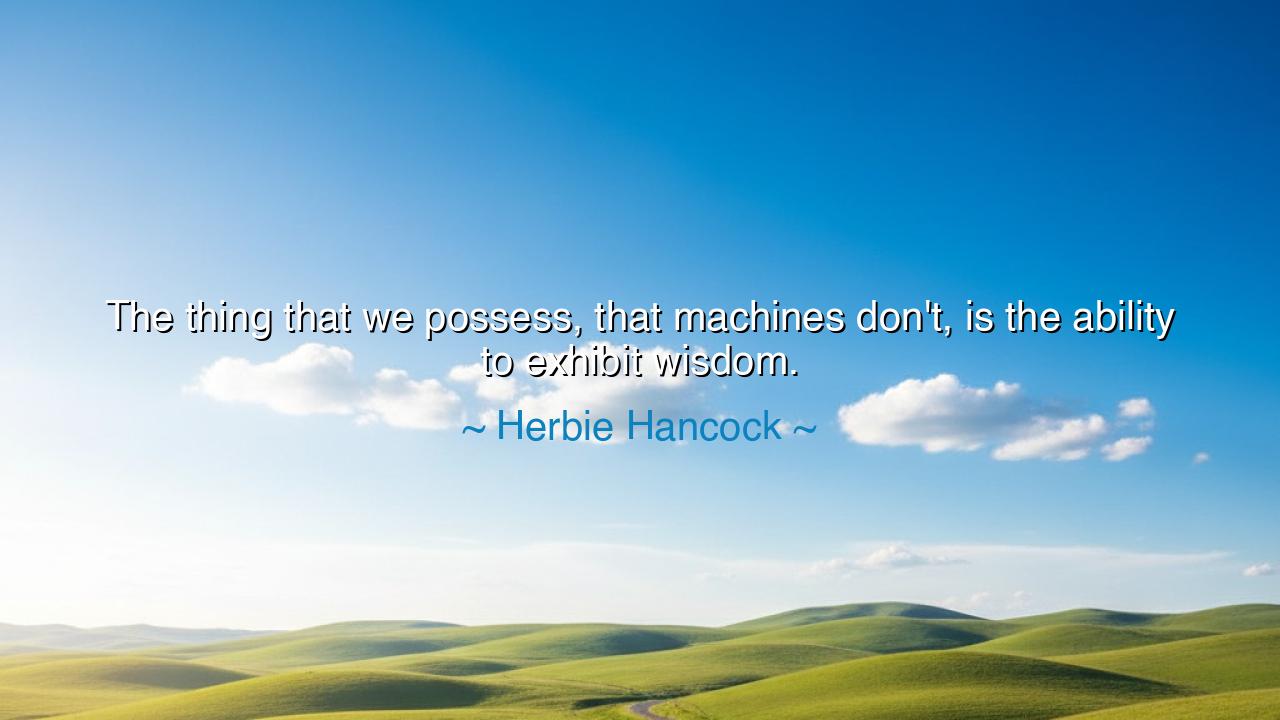
The thing that we possess, that machines don't, is the ability






“The thing that we possess, that machines don’t, is the ability to exhibit wisdom.” These words from Herbie Hancock remind us of a fundamental truth: the human spirit is a force unlike any other, one that cannot be replicated by the cold logic of machines. Wisdom, that sacred gift passed down from the ancients, is not merely knowledge or intelligence, but a deep understanding that flows from the heart, tempered by experience, compassion, and reflection. It is the soul’s ability to see beyond the immediate, to grasp the unseen threads of life, and to make choices that resonate with a higher truth.
Machines, though powerful in their precision and speed, lack the very essence of humanity — the capacity for wisdom. They are tools, devoid of spirit, programmed to execute commands without the depth of thought or feeling that guides human actions. This is the distinction that sets us apart from the mechanical world: the ability to pause, to reflect, and to choose a path not based solely on logic or efficiency, but on a deeper, more profound understanding of life and its complexities. Wisdom arises from the heart as much as from the mind, and it is this integration of spirit and intellect that makes us human.
In the ancient world, the great philosophers and sages often spoke of the importance of wisdom in guiding the course of human lives. Socrates, in his wisdom, famously declared that “The only true wisdom is in knowing you know nothing.” This humility before the vastness of the universe is the foundation of all wisdom — the recognition that we do not possess all the answers, but that through experience, reflection, and connection to others, we can come closer to truth. Wisdom, then, is not about knowing everything, but about understanding the limits of our knowledge and choosing actions that honor those limits.
Consider the story of King Solomon, revered in both the Bible and ancient traditions as a ruler of unparalleled wisdom. When two women came to him, each claiming to be the mother of the same child, Solomon did not rely solely on logic or legal reasoning. Instead, he used his understanding of the human heart, asking for a sword to divide the child, knowing that the true mother would reveal herself through her love and sacrifice. This moment of wisdom transcended mere intellect; it was a deep insight into the nature of human love and truth, something no machine could ever replicate.
The power of wisdom lies not in cold calculation, but in the ability to navigate the complexities of life with compassion, understanding, and a deep respect for the interconnectedness of all things. It is this sacred gift that makes humanity uniquely powerful — the power to choose not only what is right, but what is just, what is kind, and what is deeply true. While machines may process data at speeds we cannot match, they cannot reflect, they cannot feel, and they cannot bring forth wisdom in the way that the human heart can.
As we move forward into a world increasingly shaped by machines, we must remember that it is our wisdom that remains our greatest strength. It is this gift, passed down from our ancestors and honed through centuries of reflection, that gives us the power to shape our future with grace, compassion, and understanding. In the face of technology’s cold logic, we must hold fast to the warmth of wisdom, for it is in this that the true beauty of humanity lies.






HTC. Hoang Tuan
The idea that wisdom is what sets us apart from machines is so powerful. But it also raises the question: what makes a decision wise? We often turn to data or machines for answers, yet true wisdom seems to require a broader understanding of context, emotion, and human experience. Can we teach machines to understand these deeper layers, or is wisdom truly the one thing we can hold onto as humans?
TLThu Le
Herbie Hancock’s statement about wisdom really stands out to me because it suggests something that no matter how advanced technology becomes, it can never replace. But if wisdom is so unique to us, why does it sometimes feel like we lack it in some situations? Is wisdom about balance and perspective, and can we improve it over time, or is it something we’re either born with or not?
NT33-Vo Ngoc Tuyen
This quote makes me think about how easily we rely on technology, yet it highlights something machines can’t do—use wisdom in the decision-making process. But I’m curious: is wisdom simply an emotional trait, or does it come from rational thought and learned experience? How do we ensure that we don't lose the ability to make wise decisions just because we have machines doing so much for us?
FLFire Lizard
I love this idea that wisdom is something we, as humans, possess that machines cannot. It’s a comforting thought, especially in a world where technology is advancing so rapidly. But how do we differentiate wisdom from just sheer knowledge or intelligence? Can a machine be considered wise if it can perfectly predict outcomes, or is wisdom more about emotional intelligence and the ability to make moral decisions?
P725 Anh Phu 7/1
Herbie Hancock’s point about wisdom being uniquely human is thought-provoking. It makes me wonder: What sets wisdom apart from knowledge or intelligence? Machines are increasingly capable of processing vast amounts of information, but can they ever truly 'understand' the way humans do? Is wisdom something that requires empathy, personal experience, and a deep emotional connection to life that machines will never be able to replicate?